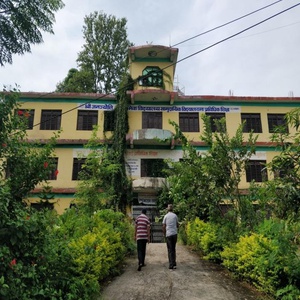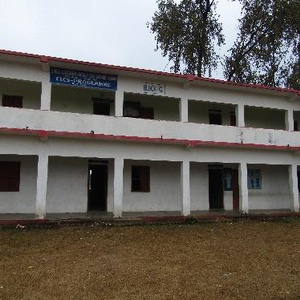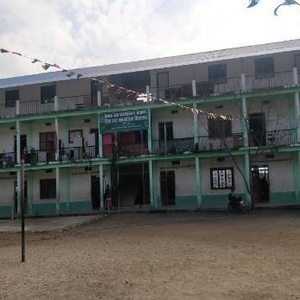Green College
Skill Up! project is built based on the learnings from previous Skill Up! project implemented in different countries of Asia and Africa, and is also outcome of a series of events, stakeholder consultations, and preparatory activities, including feasibility study conducted in Nepal. As part of global Skill Up! feasibility assessment, an International consultant visited Nepal, interacted with stakeholders at national, provinces and local levels, and also consulted with target groups. A national consultant was also mobilized to scope out the potential areas/ Municipalities for Green College (GC) establishment in Karnali and Sudurpashchim provinces. After reviewing the recommendations of the feasibility study reports ad series of consultations with the stakeholders at different levels, the implementation partners concluded the following locations for the GC establishment for phase I of the project:
- Krishnapur Municipality of Kanchanpur district in Sudurpaschim province
- Sarada Municipality of Salyan District in Karnali province, and
- Birendranagar Municipality of Surkhet district in Karnali province
These Municipalities/ locations have been further visited by WHH and CEAPRED (local partner) to confirm the technical education institutes to be working as Green colleges (and to build rapport with local stakeholders. While two vocational schools – Shree Krishna High School in Krishnapur Municipality of kanchanpur and Shivajan High School in Sarada Muicipality of Salyan districts have been found meeting the minimum required criteria (technical human resource, land and equipment for practical, laboratory facilities, class rooms) for working as Green College, its finalization in Surkhet is in process.
Click here to download the Standard Operating Procedure of Green Colleges.
Profiles of Green Colleges

Shree Jana Jyoti High School
Shree Jan Jyoti Secondary School was established on 2029 B.S, is located at Baddichaur of Barahtal Rural Municipality in Surkhet. The school is affiliated with National Examination Board (NEB) and offers plus two (10+2) programs. The School also offers different programs (short courses, 18 months & 3 years program) on Agriculture & Veterinary (Livestock) science affiliation with CTEVT.
Read More >
Shree Krishna High School
Shree Krishna High School is a public school in Kanchanpur. The school was estabished on 2017 B.S. It is located in Krishnapur-4, Gulariya. The school is affiliation with CTEVT TECS l from 2059 B.S. The school started L.P/A.H. (VJTA) 18 months from 2059 B.S., PJTA 18 months from 2061 B.S., Diploma in I.Sc. Ag (Plant Science) and Diploma in I.Sc.Ag. (Animal Science) from 2076. B.S.
Read More >
Shree Shivajan High School
Shree Shivajan Secondary School is a public school in Salyan. The school was established on BS. 2016, 11 Jestha. It is located in Sharada Municipality-1, Shitalpati. School runs CTEVT courses, TSLC and general courses upto class 12. School offers Agriculture, Forestry, Management, Education and Humanities faculty to the students.
Read More >Course Curriculum/Content
Short Term Training (15 days - 1 month), Medium Duration Training (3 - 6 months) and village-based training following Farmer Field School/ extension approach will be offered at the Green Colleges. Course curriculum and the content for the green colleges will be developed by the Incubator. The courses/ curriculum will be developed by the Incubator around the themes Sustainable Agriculture, Animal Husbandry, Fishery, Non-Timber Forest Produces, Agro-Food Processing & Value addition, Agro Equipment and Solar repairing services, Alternative Energy, etc. The centre will also develop the Standard Operating Procedures (SOP) to be followed by all Green Colleges. India GC project has already developed 22 green courses and SOP, and the incubator will work with curriculum development Experts and CTEVT to assess if these can also be adapted to Nepalese context. If CTEVT has already certified course of certain green trades, project will follow that, and all new courses has to be certified/ accredited by CTEVT system.
The Green Colleges will be set up as sustainable institutional models that can offer skill building to small-holder farmers and the rural youth. The program upgrades existing training facilities of green college partner organizations (mostly technical schools and colleges). The partner institutes have their own building, accounting system etc and project will support to strengthen their in-house capacity through equipment and materials support vital for green skill transfers. The project will initially support to ensure the proper provision of green skill trainers and facilitators.
The incubator provides institutional support services towards certification of the courses and accreditation of the colleges in collaboration with the CTEVT. The Incubator will also support the green colleges towards accessing funds of the government earmarked for training rural youth and will also support in connecting with banks and forward and backward market linkages. The green SMEs established by green colleagues will better be connected with different market segments at regional, national and export levels. The incubator will facilitate and act as bridge between SMEs products and high-end market consumers.
Training Curriculum:
- 1. Bee Keeping Training Course
- 2. Mushroom Production Training Course
- 3. Poultry Farming Training Course
- 4. Village Animal Health Worker Training
- 5. Vegetable Production Training
- 6. Goat Farming Training Course
Training and post training mentoring of youth on rural trades with high potentials
Trainings will be offered on six basic themes: (1) Sustainable Agriculture, (2) Fishery (3) Animal Husbandry, (4) Non-Timber Forest Produces, (5) Agro-Food processing and value addition and (6) Agro Equipment and Solar repairing services and Alternative Energy. All trainings combine theoretical lessons with practical assignments. The components include:
- Longer courses for people with high potential to act as multipliers in the community.
- Shorter trainings to motivate youth with no formal education.
- Post training mentoring has been identified as a success factor in ongoing Welthungerhilfe programs and includes follow up, adjusting business plans, accessing banks loans and linkages with government programmes.
- Organize trainees into producer organization or self-help groups (SHGs) for value addition, common production/marketing, and community empowerment.
SIFS Farmer Field School (FFS) – Participatory Learning and Action
The green college will mobilize its in-house trainers/ facilitators as well as champion Trainees to provide the green skills in the field (farm) directly through FFS approach. These green trades/ skills include integrated farming practices, mushroom cultivation, composting, vermicompost preparation, etc. In total, 2,516 farmers will be trained based on their need and demand. These farmers will also be certified by the green colleges. These farmers are organized into 90 groups and in total 1,800 FFS session will be conducted.
Trainings Associated to Green Colleges
| S.N. | Training Name | Green College Name | Duration | No. of Participants | Remarks |
|---|---|---|---|---|---|
| 1 | Poultry Production | Shree JanaJyoti Secondary School | 60 Days | 25 | N/A |
| 2 | Commercial Vegetable Production | Shree JanaJyoti Secondary School | 60 Days | 26 | N/A |
| 3 | Goat Raising | Shree JanaJyoti Secondary School | 60 Days | 20 | Joint Support of CTEVT & Skill Up |
| 4 | Mushroom Cultivation | Shree Shiva Jan Secondary School | 65 Days | 30 | N/A |
| 5 | Commercial Vegetable Production | Shree Shiva Jan Secondary School | 65 Days | 25 | Joint Support of CTEVT & Skill Up |
| 6 | Mushroom Cultivation | Shree Shiva Jan Secondary School | 30 Days | 25 | Joint Support of CTEVT & Skill Up |
| 7 | Poultry Production | Shree Shiva Jan Secondary School | 60 Days | 25 | N/A |
| 8 | Commercial Vegetable Production | Shree Shiva Jan Secondary School | 60 Days | 25 | N/A |
| 9 | Commercial Vegetable Production | Shree Krishna Secondary School | 60 Days | 28 | N/A |
| 10 | Mushroom Cultivation | Shree Krishna Secondary School | 30 Days | 30 | N/A |
| 11 | Poultry Production | Shree Krishna Secondary School | 60 Days | 25 | N/A |
| 12 | ToT participants (Farmer Group Leader) of Kanchanpur-I | Farmer Field School | 2 Days | 14 | 23-24 Feb 2020 |
| 13 | ToT participants (Farmer Group Leader) of Surkhet-I | Farmer Field School | 3 Days | 11 | 12-14 Mar 2020 |
| 14 | ToT participants (Farmer Group Leader) of Salyan-I | Farmer Field School | 3 Days | 21 | 12-14 Aug 2020 |
| 15 | ToT Participants (Farmer Group Leader) of Surkhet-II | Farmer Field School | 2 Days | 10 | 9-10 Sep 2020 |
| 16 | ToT participants (Farmer Group Leader) of Kanchanpur-II | Farmer Field School | 3 Days | 10 | 15-17 Oct 2020 |
| 17 | ToT participants (Farmer Group Leader) of Kanchanpur-III | Farmer Field School | 3 Days | 20 | 9-11 Feb 2021 |
| 18 | ToT participants (Farmer Group Leader) of Salyan-II | Farmer Field School | 3 Days | 26 | 22-24 Feb 2021 |
| 19 | ToT participants (Farmer Group Leader) of Surkhet-III | Farmer Field School | 3 Days | 22 | 24-26 Feb 2021 |
| 20 | Vegetable Production | SHREE KRISHNA SECONDARY SCHOOL | 60 Days | 28 | N/A |
| 21 | Goat Farming | SHREE KRISHNA SECONDARY SCHOOL | 60 Days | 29 | N/A |
| 22 | Vegetable Production | SHREE SHIVA JAN SECONDARY SCHOOL | 60 Days | 22 | N/A |
| 23 | Goat Raising | Shree JanJyoti Secondary School | 60 Days | 25 | N/A |
| 24 | Mushroom Production | Shree JanJyoti Secondary School | 30 Days | 25 | N/A |
| 25 | Commercial Vegetable Production | Shree JanJyoti Secondary School | 60 Days | 25 | N/A |
Follow Us On
Contacts
Welthungerhilfe (WHH), Nepal
Bakhundole, Lalitpur 44600
01-5552060

CEAPRED ( Kathmandu and Surkhet)
Shantibasti, Nayabato (Ringroad), Lalitpur

GeoKrishi
Thapathali,
Kathmandu
01-4101544
